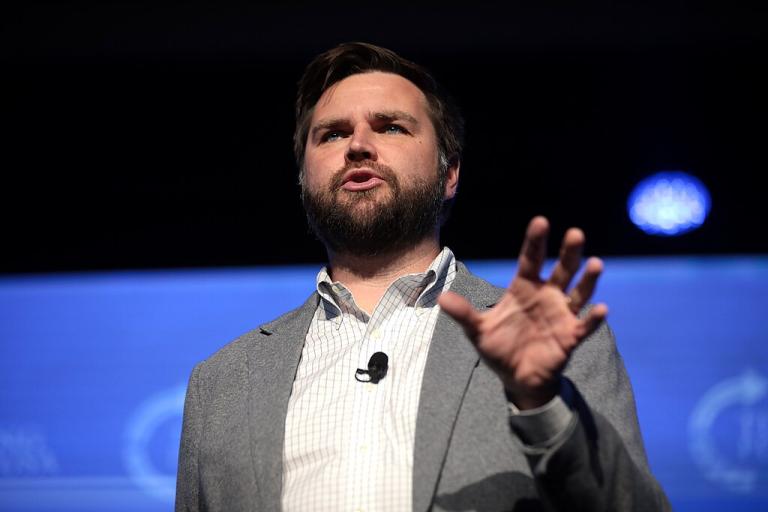Back in 2016, I read Hillbilly Elegy by J. D. Vance and I’ve blogged quite a bit about it (e.g., this). His memoir of growing up in poverty in dying rural towns and rust belt cities–with their broken families, opioid addiction, and shutdown factories–is a compelling account of the plight of today’s white working class, the most unchurched demographic in America.
Vance paints an honest picture, not drawing back from the woes that so many of his friends and family brought on themselves–their habits of dependence, passivity, and failure to take responsibility for their actions–but it is affectionate nonetheless. He himself learned self-discipline when he joined the Marines and served in the war in Iraq. Afterwards, he defied his background by going to college on the G.I. Bill and making it into Yale law school, leading to a successful career.
Little did I imagine when reading this book that the author would be selected by Donald Trump to be the Republican Vice Presidential nominee. I’m sure at the time that he didn’t either.
Vance put into words the alienation, desperation, and neglect that Donald Trump tapped into and that elected him to the presidency. Vance became one of the thinkers who saw in Trump’s victory a new model for conservatism.
Here at this blog we’ve discussed the schism in American conservatism. One one side is the Reagan ideal of small government, free market economics, and a commitment to individual rights and liberty, all of which are hallmarks of “liberal [that is, freedom enabling] democracy” as embodied in American constitutionalism. On the other side would be the various versions of “national conservatism” with its big government, protectionist economics, and communitarian (as opposed to individualistic) ideals. Vance, I believe, considers himself “postliberal.” An extreme form of this would be the “illiberal” conservatism of the integralists who would be glad to set up a state (Catholic) church.
Vance has become a spokesman for this “New Right.” Ian Ward wrote back in March,
In certain conservative circles, Vance has emerged as the standard-bearer of the “New Right,” a loose movement of young, edgy and elite conservatives trying to take the ideological revolution that began under Trump — including his overt embrace of nationalism, his hard-line stance on immigration, his vocal opposition of U.S. involvement in foreign conflicts like Ukraine and his overt skepticism toward certain liberal democratic principles — in an even more radical direction. Unlike Trump’s more conventional Republican followers, Vance’s New Right cohort see Trump as merely the first step in a broader populist-nationalist revolution that is already reshaping the American right — and, if they get their way, that will soon reshape America as a whole.
Politico’s Victoria Guida concludes in the words of the title of her article, The Trump-Vance Ticket is a Repudiation of Free-Market Conservatism. “Few Republicans have been more vocally critical of the party’s modern economic conventions than Vance,” she writes, “who has embraced not just tariffs, but also policies like a higher minimum wage and increased barriers to corporate mergers — even openly praising President Joe Biden’s aggressive antitrust chief, Lina Khan.” And “He is uninterested in traditional small-government priorities.”
Vance, a recent convert to Catholicism, is, though, strongly pro-life. To the point that Democrats hope to hit him hard on the issue. And he takes his faith seriously in his politics. Matthew Schmitz of First Things describes him as “He is perhaps the most eloquent champion of a new Christian approach to politics—one that is less conventionally conservative, and more populist.”
The approach Christians have been taking, says Schmitz, has been uncritical adherence to Republican conventional wisdom: “For at least a generation,” he says, “the phrase ‘religious right’ has evoked a style of politics marked by hortatory rhetoric, foreign-policy interventionism, and support for the free movement of people and goods.” But Vance has a different vision of Christian conservatism. He told Schmitz:
“When we think about Christian conservatism, we think of sanctity of marriage, sanctity of life,” he tells me. “Of course these things are important and I certainly believe the Church’s teachings on all of these things. And yet, there’s an entire Christian moral and economic worldview that is completely cut out of modern American politics, and I think it’s important to try to bring that back.”. . .
Vance extends this emphasis on stability to other areas of economic and social life. “The core Christian insight into politics is that life is inherently dignified and valuable,” he says. “If you actually believe that, you want certain legal protections for the most vulnerable people in your society, but you also want to ensure that workers get a fair wage when they do a fair job. You want to make sure that people don’t have their town poisoned because they happen to live next to a railway line”—a reference to the rail disaster in East Palestine, Ohio.
I like Vance, and I appreciate his concern for common folk. I have no problem with his broader and deeper Christian approach to politics, one that attends to the problems of people in need and is not just uncritically pro-business and pro-military intervention.
But I remain more of a Reagan-style conservative, suspicious of big government, worried about the deficits, and protective of individual liberty. A big government led by good people might do some good, but what makes anyone thinks such power will always be in good hands? And if the big government goes into the business of enforcing morality and establishing a religion, what morality will that be? And what kind of religion? If Christianity, what theology will it follow? The state by its nature can only be concerned with law and obedience. If religion is brought in to assist with that, the religion is bound to be legalistic and anti-gospel.
As has been said here, we need a political system that protects us little people from our government. Our Constitution manages to do that. Some alternative “illiberal” system of government will not.
So I have mixed feelings about Vance, not so much as Vice President–what harm can he do?–but, since that office is often a springboard to something more, as Trump’s heir apparent.
Help me out here. What do you think?
Photo: J. D. Vance by Gage Skidmore from Surprise, AZ, United States of America, CC BY-SA 2.0 <https://creativecommons.org/licenses/by-sa/2.0>, via Wikimedia Commons











